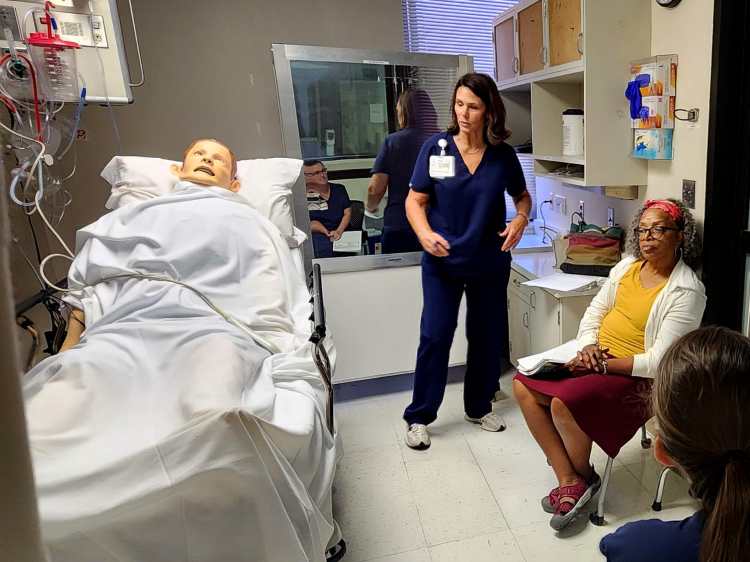Clinical Simulation welcomes Diabetes Scholars

Each year, learners from across UAB Medicine step into the Diabetes Scholar Program (DSP) to strengthen their knowledge, refine clinical judgment and advance diabetes care within their units.
As part of the Department of Interprofessional Practice and Training (DIPT), the program blends coursework, clinical experiences, mentorship and simulation to develop diabetes champions across the health system.
“Simulation serves as a cornerstone of the DSP learning experience,” said David H. James, program development manager with DIPT and clinical assistant professor in the UAB School of Nursing. “It bridges classroom knowledge with real-world clinical practice.”
Open to both licensed and unlicensed staff, the Diabetes Scholar Program includes two tracks. The Advocate Program spans one year and focuses on foundational diabetes care and an education project. The Advanced Program extends over two years and adds individualized mentorship and a quality improvement project within the scholar’s home unit. Both follow the first-year curriculum together, building a shared base of evidence-based diabetes care, clinical skills and interprofessional collaboration.
Simulation is where those lessons begin to take shape. At UAB Clinical Simulation, DSP learners work through two high-risk, high-frequency scenarios: Hypoglycemia Identification and Management and Diabetic Ketoacidosis (DKA) Management. Using high-fidelity manikins and standardized patients, learners manage complex events while practicing communication, decision-making and team-based care.
During the simulations, scholars focus on assessing patient and caregiver education needs, applying hospital order sets and using 3Es communication and teach-back strategies to build trust and ensure understanding.
“Each case requires participants to demonstrate clinical judgment, teamwork and patient-centered communication,” James said. “These experiences reinforce both technical and interpersonal competencies.”
Preliminary program evaluation shows strong results, James noted, adding that participants consistently report increased confidence in inpatient diabetes management, greater clarity in interprofessional roles and communication, and meaningful application of project work in their home settings. Additionally, scholars have already begun developing education and QI projects that address real clinical needs, including early exploration into barriers to hypoglycemia prevention.
James noted that these experiences help learners translate knowledge into everyday impact.
“Simulation creates an authentic environment where they can practice safely, make mistakes and reflect,” he said. “It empowers them to integrate evidence-based diabetes management and patient education into their clinical practice.”
DSP is part of a broader interprofessional scholar model that also includes Wound, Geriatric and Patient Support programs.
“Together, these initiatives aim to enhance professional development, improve patient outcomes and strengthen quality improvement capacity across UAB Medicine,” James said.
To learn more about the Diabetes Scholar Program and DIPT, visit here. To learn how simulation can benefit your own team or department, email simulation@uabmc.edu.
UAB Medicine’s Clinical Simulation program offers opportunities for individuals and teams across UAB Medicine and beyond to practice before they deliver care. We encourage all who provide and support patient care to “Sim First.” Together, we can put our patients’ safety first.




0 Comments